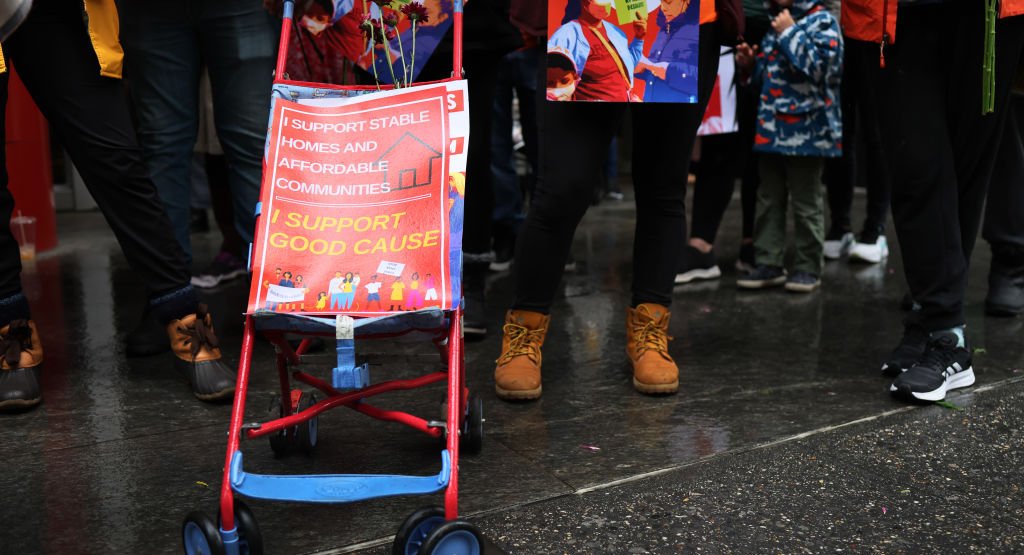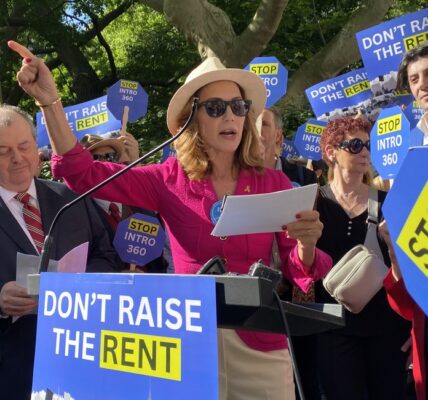Is that rent hike legal? These are the new rights for NYC tenants with ‘good cause’ in effect.
Maybe your landlord is jacking up the rent. Or maybe the company that owns your building says you can’t renew your lease when it expires next month.
In the wake of new tenant protections passed by state lawmakers last month, tenants across New York City are wondering what’s allowed.
The new “good cause” measure, which is so named because owners must justify their reason for raising rents or not renewing a lease, is supposed to limit dramatic rent hikes and require landlords to renew leases for rule-following residents. But the law comes with a number of carveouts and caveats that are leaving tenants with questions.
More than 20 people reached out to Gothamist to share their own experiences and inquiries about how the law affects them.
Tenant attorney Ronald Languedoc, co-chair of the New York City Bar Association’s Housing Court Committee, said the influx of questions is no surprise given the law’s “gray areas.” He said lawyers and judges are also trying to get up to speed.
“There’s going to have to be a lot of education for the bar and the bench about this law, and obviously for the public,” he said.
Under the law, landlords can raise rents for existing tenants by 8.82% this year without having to justify the increase, according to a notice published by the state’s Division of Homes and Community Renewal. Tenants facing higher hikes can challenge the owner in housing court if their landlord files an eviction case against them.
But, Languedoc said, it’s important to know that the law doesn’t automatically cap rents. Instead, it allows tenants to fight big increases or non-renewals in housing court if they think they qualify for good cause.
“The onus is on the tenant,” Languedoc said.
Here’s what some renters who contacted Gothamist are wondering.
How do I know if I’m covered?
The new law comes with several exemptions that can make it hard for many tenants to find out if they’re covered.
It’s more straightforward for tenants living in buildings constructed before the start of 2009 that have more than 10 units and rent below about $6,000 a month for a one-bedroom. Those renters are likely covered by the good cause law.
Landlords don’t have to inform tenants whether they qualify for good cause protections in leases until late August.
The Real Estate Board of New York has circulated a sample lease rider to its members that has specific disclosure language cribbed from the legislation. And law firms are advising landlords on the impact of the new rules while urging compliance to avoid losing challenges in housing court.
In the meantime, tenants can try to determine whether they are covered on their own. The apartment listings website openigloo is using property records to indicate whether a unit is likely covered by good cause.
Am I covered if I live outside New York City?
No. The new good cause law only covers people in the five boroughs. Other towns can pass their own laws opting in.
I’m paying $7,100 a month for a two-bedroom. Can my landlord raise the rent to $9,000?
The landlord can probably raise the rent, and there’s not much the tenant can do about it.
The new law only applies to apartments with rents at or below 245% of the fair market rent set by the federal government. That’s about $6,005 for a one-bedroom and $6,742 for a two-bedroom apartment.
My landlord said I couldn’t renew the lease before the law took effect. Do I have to leave?
No, but be prepared to go to court.
That’s the situation faced by Allison Lindfors, Ronni Sepesi and Alexa Garcia, who have been living in their three-bedroom in Bushwick for about six years. The three of them pay about $3,200 a month — a decent deal in a gentrifying neighborhood where median rents have surged over the past decade, according to an analysis by NYU’s Furman Center.
In February, they received notice that the landlord, a limited liability company linked to dozens of properties in the area, would not renew their lease after it expired on May 31. The landlord did not initially provide a reason and, prior to the good cause rules, the property owner did not have to.
After Lindfors, 28, requested more information, the property management company responded in an email that the owners “would like to have the opportunity to do some work as this unit has been occupied for a long time,” according to a copy shared with Gothamist.
But Lindfors, Sepesi and Garcia say they want to stay put. They said hey have been paying rent on time each month and should be entitled to a lease renewal under the new law.
“We really don’t have the means and we’re not in a situation to be able to move right now, Lindfors said. “We think it’s wrong that they see that they can get more money and just want to get us out so they can do that.”
All three said they would struggle to pay a broker fee, security deposit and moving costs for a new apartment. Lindfors said she was recently laid off from her marketing job and Sepesi and Garcia have only recently started new jobs.
Garcia said the roommates are committed to challenging the landlord in court if it comes to that — something she thinks most owners don’t expect.
“They know [most] people aren’t going to spend the money to fight it or do something about it,” said Garcia, 37. “They will just suck it up and leave, even though it’s really, really hard for everybody here to do something like that. It’s New York City.”
The property management company, Gold Management, did not respond to requests for comment, nor did company executives who signed property documents.
Housing attorneys say tenants in this situation have a strong case to stay under the new good cause rules.
“If a landlord were to bring a case today to evict a tenant and say ‘I don’t have to have a cause and I don’t have to give a notice explaining my cause,’ the landlord would lose,” said Ellen Davidson, an attorney with the nonprofit Legal Aid Society who consults lawmakers on tenant regulations. “The point is the landlord has to give a reason and has to give it in writing.”
Languedoc, the co-chair of the city bar association’s housing court committee, also said the law should cover tenants whose leases expire after the law took effect last month.
My landlord notified me of a hefty rent hike before the law took effect. Do I have to pay that much?
This is a common question among tenants.
Renters who didn’t sign the lease renewal can now remind landlords of the new law limiting increases to 8.82% without a specific reason.
That worked for Sarah Brown, a Williamsburg renter who pays $2,700 a month for the two-bedroom apartment she shares with a roommate.
Brown said her landlord informed her and her roommate that the rent would go up by 18% when the lease expires on May 31. But Brown said she had recently seen a TikTok video about the good cause law posted by openigloo, and did some more research.
She said she realized her apartment was covered by the new protections and emailed her management company, pointing to the good cause statute. The company offered her a new lease with an 8.5% increase.
“If I hadn’t come across this TikTok video or been aware of the Good Cause Eviction Act, I would have just settled for the 18% increase because there’s nothing cheaper out there,” she said. “Or I would have just moved altogether.”
Davidson, from Legal Aid, said the outcome shows the importance of communication among landlords, property managers and tenants.
“That is exactly how things should work out,” she said. “Someone who hasn’t signed a lease should talk to their landlord and tell them that the landlord has to follow the new law and they should get a new lease with the right amount of increase.”
Landlords, in turn, should talk to tenants about why they think a larger increase is justified, she added.
Tenants who already signed the new lease are probably out of luck, though they can still try to challenge major increases on future leases.
Languedoc said he expects landlords may try to argue that they are entitled to an increase over the good cause threshold, and it’ll be up to the tenant to decide whether to fight it.
“I wouldn’t be surprised if there are a lot of cases where a landlord will push the envelope and ask for more than 8.50% on the theory that they know most tenants will not want to challenge it,” he said.
Your landlord is claiming big new expenses. Can they jack up the rent?
This is where things can get trickier.
The new law explicitly states that judges can approve increases above the good cause limit after accounting for landlords’ rising costs for things like fuel, maintenance and insurance. The law also states that judges should consider a landlord’s property tax expenses.
Higher bills may merit rent increases beyond the allowable threshold. That can be a problem for tenants in buildings subject to tax breaks that are set to expire.
Financial advisor Andrew Rose and his wife, a public school teacher, pay just under $3,100 a month for their one-bedroom apartment in Williamsburg. The unit has been subject to rent-stabilization protections because the owner received a property tax break under the state’s 421-a program.
They received notice in March that the landlord planned to raise their rent by $1,300 a month. Rose said he responded to the rent hike in an email last month and cited the good cause rule. The building’s leasing agent replied that because the tax break was expiring, the landlord was facing a much higher property tax bill that justified the massive rent increase.
Joseph Goldsmith, an attorney for the limited liability company owner tied to the firm Witnick Real Estate Partners, pointed to city finance records showing the tax break will expire.
“It is clearly written in the Good Cause Eviction statute that a landlord is entitled to an increase above the threshold when there are increases in management, insurance, costs, and then it specifically calls out real estate taxes,” he said. “You have a pretty clear scenario in a building like this one because the abatement is ending and it’s evident.”
But Rose and his wife, who are expecting their first child later this year, said the increase was abrupt.
“This was not in the plans,” he said. “We had mentally prepared to resign our lease for this year and have the first year with our daughter in this place, and a wrench was thrown in the mix.”
He said that rather than challenge the hefty rent hike, he and his wife decided to search for a new apartment. They found a place in Sunnyside for about $3,350 a month.
Languedoc, the co-chair of the city bar’s housing court committee, said he expects that many tenants who can afford other options will probably follow the same course of action.
“Because there is so much gray area, how many tenants are going to want to invest all the time and effort and money in a housing court case they might not prevail in, especially when other life circumstances are going on?” he said.
What happens if I do challenge a rent increase or eviction in court?
If a tenant thinks they should be entitled to a lease renewal or a cap on their rent increase, they can use that as a defense in housing court after the landlord files for an eviction.
But Languedoc cautioned that a housing court case could be something that future landlords consider when deciding whether to accept a tenant. It can also be a major hassle for people with other housing options.
“A lot of tenants will say that even if they are in the right or probably in the right, they still will move because they don’t want the public record of the court case,” Languedoc said. “ A landlord cannot deny someone an apartment based on a filing, but they have the information.”
But for tenants who can’t afford to move or pay a huge new rent, challenging the eviction on the new good cause grounds could be a smart move, he added.
“People who are really living paycheck to paycheck and every expense affects them — there are a lot of people like that — some of them will challenge an increase of that nature,” he said.
After that it will be up to judges to decide the outcomes, potentially establishing precedents for future cases.
Lucas Ferrara, an attorney whose firm represents landlords and tenants, said judges will play a major role in interpreting the new law by determining what owner expenses are allowable and how evidence is presented. “It will be interesting to see how all this plays out in the courts,” he said. “Fasten your seatbelts. It’s going to be a bumpy, and contentious, ride.”





